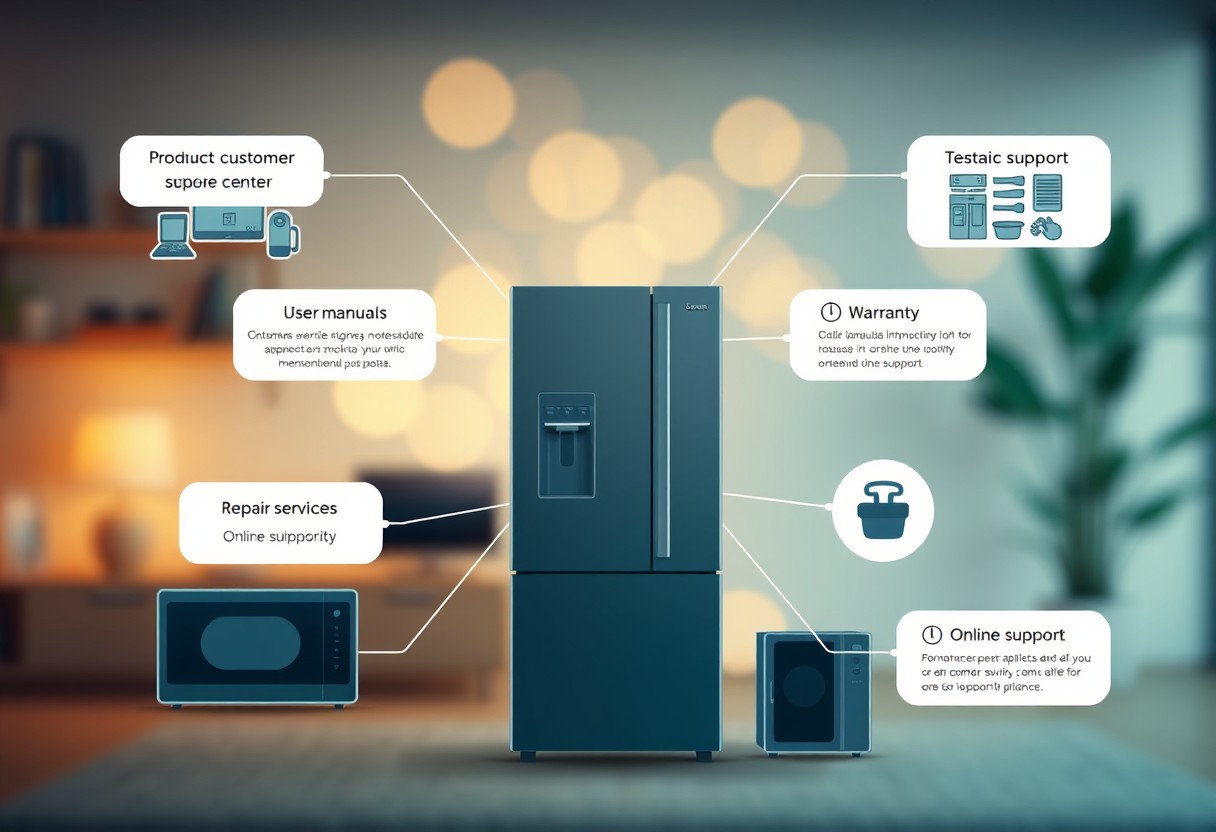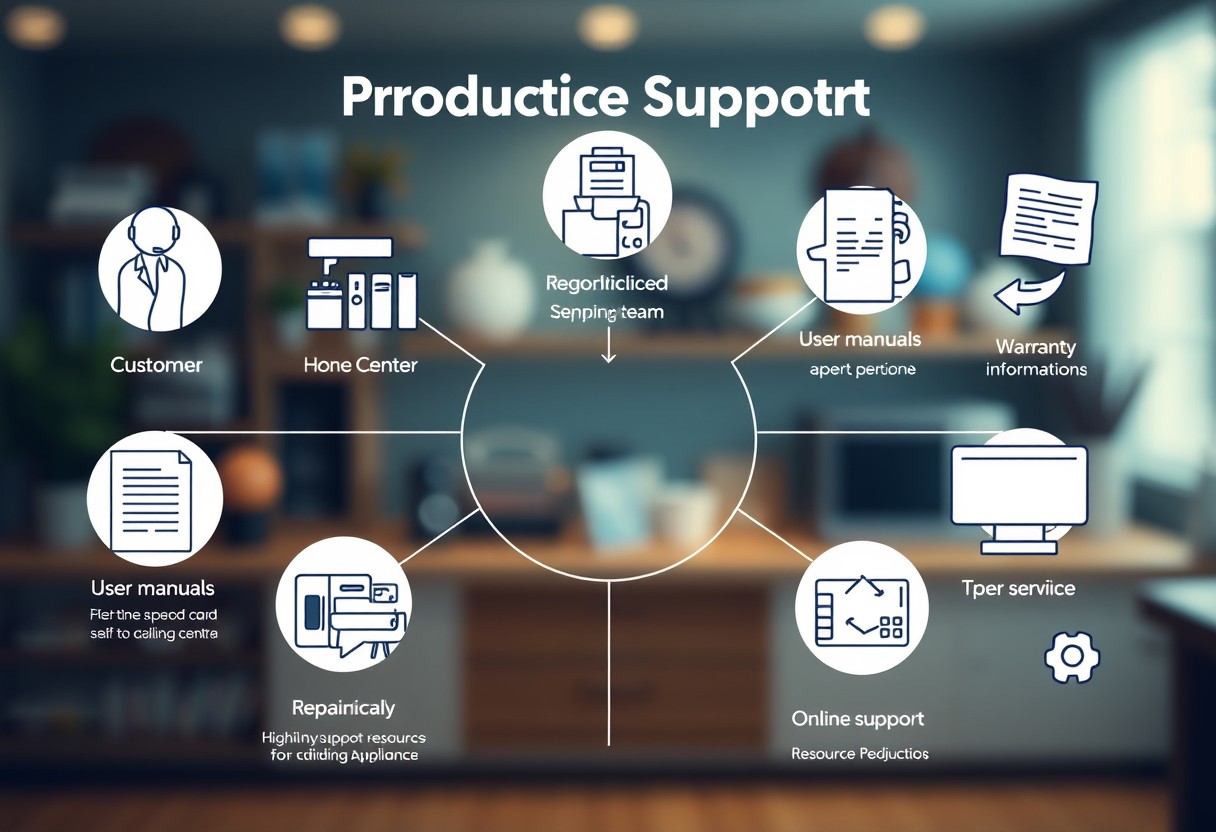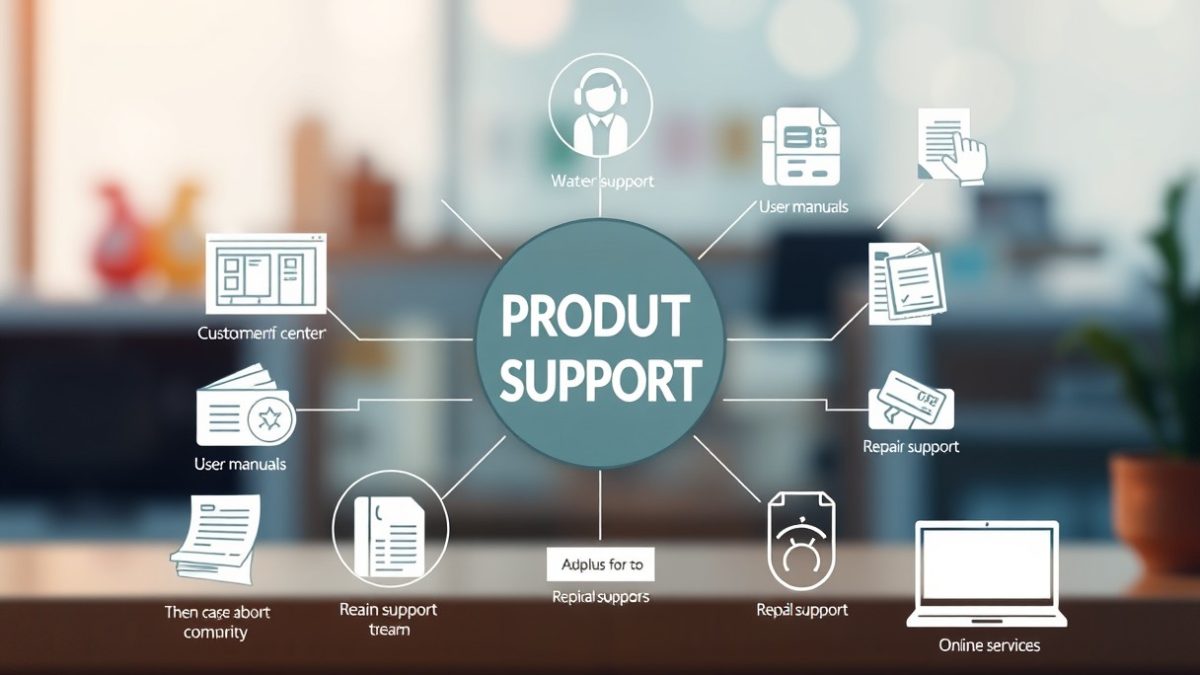
How Do Gas And Electrical Appliance Installations Compare In Complexity?
September 11, 2024
Are Extended Warranty Customer Relationship Management Strategies Effective?
September 13, 2024Most consumers underestimate the importance of adequate product support for their home appliances, which can lead to frustration and costly repairs. Understanding the key components of product support ensures you receive the benefits you deserve, including warranties, customer service, and repair resources. By knowing what to look for, you can make informed decisions that enhance the longevity and efficiency of your appliances. In this blog post, we will guide you through identifying these crucial elements, so you can confidently manage your home appliance needs.
Key Takeaways:
- Customer Service: Provides assistance to users regarding appliance setup, functionality, and troubleshooting issues.
- Warranty and Repair: Outlines coverage options, repair procedures, and replacement policies to ensure customers are supported throughout the product’s lifespan.
- Maintenance and Resources: Offers guidelines for regular maintenance, user manuals, and online resources to help consumers optimize appliance performance.
Understanding Product Support
Before delving into the specifics of product support for home appliances, it is vital to grasp its fundamental definition.
Definition of Product Support
An integral aspect of the consumer experience, product support encompasses all the services and assistance that a manufacturer or retailer provides to you after the purchase of a home appliance. This includes everything from installation guidance and troubleshooting assistance to warranty services and access to replacement parts. Effective product support aims to ensure that you can use your appliance efficiently and that any issues are resolved quickly and satisfactorily.
Product support also involves providing information and resources that help you understand your appliance’s features and functions better. By offering manuals, FAQs, troubleshooting guides, and customer service, product support creates a bridge between your expectations and the appliance’s performance.
Importance of Product Support for Home Appliances
Support for home appliances is a crucial factor that can significantly enhance your overall ownership experience. When you purchase an appliance, you naturally expect it to meet your demands. However, issues can arise, and knowing that reliable support is available can alleviate your concerns. Effective product support ensures that you receive timely assistance whether you face a minor malfunction or a major repair, ensuring that your appliance remains functional.
Moreover, a well-structured product support system can lead to increased satisfaction and trust in the brand. If something goes wrong, it’s reassuring to have strong support readily accessible. If you are unsure about how to resolve a conflict with your appliance, being able to reach out for help can save you from unnecessary stress.
Appliances are vital components of your daily life, and their proper functioning is vital for your convenience and safety. Ensuring you have access to good product support can enhance your experience, enabling you to resolve issues efficiently and enhancing the longevity of your appliance. Recall, engaging with product support not only helps you in addressing the immediate concerns but also contributes to a more positive overall interaction with your home devices.

Key Components of Product Support
Some key components of product support for home appliances enhance the overall customer experience while ensuring your devices operate effectively and efficiently. Access to reliable customer support, warranty services, and repair options is imperative for maintaining the longevity and functionality of your appliances. Understanding these components can help you leverage them effectively, should you require assistance with a home appliance.
Customer Service Accessibility
Product support begins with customer service accessibility, which plays a critical role in how quickly and effectively you can resolve any issues that arise with your appliance. A responsive customer support team makes it easier for you to get necessary information, whether it’s troubleshooting guidance or product recommendations. Look for companies that offer multiple channels of communication, such as phone, email, and live chat, so you can choose the method that works best for you.
Moreover, accessible customer service should also mean availability during convenient hours, along with multilingual support in some cases. This ensures that whatever your needs, you can reach out and find assistance without unnecessary delays. It’s imperative to know that help is just a call or message away, giving you peace of mind when dealing with home appliance issues.
Warranty Information
Components of product support include critical information regarding warranty policies. Understanding your warranty can help you navigate issues when appliances fail within a specified period. Typically, warranties cover defects in materials and craftsmanship, ensuring that you receive necessary repairs or replacements at no additional cost, provided you adhere to the warranty terms.
To make the best use of your warranty, always read the fine print and familiarize yourself with the specific coverage periods and any required maintenance tasks. Keeping records of your purchase, including receipts and warranty information, is vital to ensuring you can claim your rights if a problem arises. Many manufacturers include registration options to streamline this process, so take advantage of it.
Repair Services and Maintenance
Service and maintenance options provide crucial support for your home appliances, ensuring they operate at peak efficiency. When problems arise that can’t be remedied through customer service, having reliable repair services is imperative. Look for brands that offer authorized repair technicians or recommend credible third-party services to handle any necessary fixes without voiding your warranty.
Plus, regular maintenance can enhance your appliance’s lifespan and performance. Some companies offer home maintenance plans that include routine inspections and tune-ups, preventing minor issues from becoming major repairs. Understanding the maintenance options available can save you time and money in the long run, keeping your appliances in great working order.
User Manuals and Documentation
Product manuals and documentation serve as imperative resources for understanding your appliance’s features and settings. They provide you with necessary guidelines for optimal usage, troubleshooting, and maintenance practices. Access to a comprehensive manual can empower you to make informed decisions about your appliance and maximize its functionality.
It’s important to keep your user manual accessible for reference, whether in physical or digital format. Many manufacturers now offer downloadable versions of manuals online, allowing you to quickly find information without digging through paperwork. Always check the manufacturer’s website for any updated documentation that may include corrections or enhancements to your appliance’s operation.
Parts Availability
Manuals for home appliances typically highlight the importance of parts availability. When a component fails, having access to replacement parts is imperative for conducting timely repairs and maintaining functionality. Some manufacturers provide direct ordering options for parts, while others partner with third-party suppliers to extend the availability of necessary components.
Accessibility to replacement parts means you won’t have to worry about lengthy downtimes or costly service calls. Plus, if you’re handy, knowing where to source parts can enable you to perform repairs yourself, further reducing expenses. Always verify that parts are compatible with your specific appliance model to avoid any issues during installation.

Training and Resources
Once again, the emphasis on training and resources cannot be overstated when it comes to providing effective product support for home appliances. Your ability to assist customers hinges on having the right information and skills at your disposal. This chapter will explore the various elements that contribute to a robust support framework, focusing on technician training programs, online resources, video tutorials, and community support forums.
Technician Training Programs
Training programs for technicians are critical to ensuring that your support staff has the expertise needed to tackle product issues effectively. These programs often include comprehensive courses on appliance repair, safety protocols, and troubleshooting procedures. By investing in thorough training, you equip your technicians with the skills they need to diagnose and resolve problems efficiently, which can lead to increased customer satisfaction.
Moreover, staying updated with the latest technological advancements in home appliances is important. Training should not be a one-time event; it must be continuous to keep up with new models and features. Offering regular workshops and refresher courses can help your team remain competent, making them more confident in their ability to support your customers.
Online Resources and FAQs
The availability of online resources and FAQs can be incredibly beneficial in providing your customers with quick answers to their queries. This readily accessible information helps users troubleshoot common issues without needing to call your support center. You can enhance your customer’s experience by maintaining a well-organized database of common questions and solutions, which can alleviate frustration and minimize downtime.
It is important that your FAQ section is updated regularly based on customer feedback and the most frequently reported issues. This practice not only keeps the information relevant but also demonstrates your commitment to supporting your customers in a proactive manner. By allowing customers to find answers independently, you also free up your support team to focus on more complex queries that require a personal touch.
Video Tutorials and Guides
Technician involvement doesn’t stop at resolving issues; they can also create invaluable video tutorials and guides for customers. These visual aids can simplify complex processes like installation or troubleshooting by providing step-by-step instructions. You can leverage platforms like YouTube or your company website to host these tutorials, making them easy for customers to access at their convenience.
Training your technicians to produce these resources involves providing them with the right tools, techniques, and storytelling skills to engage viewers. Effective video tutorials can boost customer confidence while also reducing your support workload, as many users will feel empowered to solve their problems independently.
Community Support Forums
On top of formal resources, fostering community support forums can create an environment where customers help each other with their appliance issues. These forums can be an invaluable platform for exchanging tips, sharing experiences, and discussing solutions to common problems. You can moderate these forums to ensure that the information shared is accurate and helpful, further enhancing the support ecosystem for your products.
Moreover, community support forums can provide you with insights into recurring issues or popular topics among your customers. This feedback loop can guide your future enhancements in training and product development, ensuring that you continuously improve their experience.
Resources like these are important for effective product support. They empower your customers and technicians alike, creating a community where both parties can thrive together. Having a rich repository of training materials, online FAQs, video content, and interactive forums can dramatically enhance the effectiveness and perception of your overall product support efforts.
Feedback and Improvement
To ensure that product support for home appliances remains effective and relevant, feedback and improvement strategies are crucial. By actively seeking input from customers, you can refine and enhance the support experience for everyone. This allows you to address issues more effectively and adapt your approach based on real-world use cases and user experiences. The cycle of feedback and improvement can lead to a more trustworthy brand reputation and better customer relationships.
Customer Feedback Mechanisms
Customer feedback mechanisms are necessary tools for gathering insights from your users regarding their experiences with your products and support services. This can involve surveys, focus groups, online reviews, and customer service interactions. Each of these channels gives you the opportunity to understand what your customers appreciate and what areas need attention. Incorporating these feedback channels enables you to create a two-way relationship where customers feel heard and valued.
Moreover, employing technology such as automated feedback request systems can simplify the process for both you and your customers. By sending follow-up emails post-interaction, or implementing in-app feedback features, you can unobtrusively collect valuable data that informs your product support strategies. Actively responding to this feedback not only helps you improve but also enhances customer loyalty.
Analyzing Support Requests and Trends
The analysis of support requests and trends is a critical aspect of identifying recurring issues or potential areas for product improvements. By reviewing data related to the types of inquiries and problems submitted by customers, you can pinpoint specific areas that need attention. This analysis can reveal patterns that may not be immediately apparent, such as particular models experiencing more frequent problems or regions with distinct concerns. Understanding these trends allows you to prioritize your support efforts and develop solutions that enhance overall customer satisfaction.
Trends in customer behavior and support requests serve as indicators of how your products perform in the real world. By monitoring these patterns over time, you can predict future issues and take preventive actions. This proactive approach can significantly mitigate challenges before they escalate into larger problems. Recognizing and addressing these trends not only benefits your customers but also reinforces your commitment to quality and reliability.
Continuous Improvement Strategies
For any organization focused on product support, continuous improvement strategies are vital. Implementing techniques such as routine training for support staff, process optimization, and performance metrics can help you identify areas for enhancement. Regularly scheduled reviews of your support procedures can unearth inefficiencies and lead to significant improvements in how you assist your customers. Additionally, fostering a culture that values learning and adaptation within your team will inspire innovative solutions to enhance the customer experience.
It is also beneficial to actively seek external benchmarks and best practices within the industry. By comparing your support processes with those of successful competitors, you can understand where you stand and identify strategies for improvement. Collaboration with other professionals and accepting innovative ideas can spark new methods to enhance the quality of your product support.
Technology Integration
Keep in mind that the integration of technology into product support for home appliances has transformed the way you interact with your devices. This revolution is not just about enhancing functionality but also about improving your overall experience as a user. With the advancement of smart technology, your home appliances can now communicate with you and provide real-time assistance, making your day-to-day tasks more manageable and efficient.
Role of Smart Technology in Product Support
Smart home devices are designed to simplify your life. They can automatically diagnose issues, send you alerts about improper functioning, and even provide troubleshooting tips directly to your smartphone. This level of integration allows for swift action, ensuring that your appliance issues can be resolved quickly, reducing downtime and inconvenience. Furthermore, with features like self-updating firmware, these appliances can continuously improve their performance, keeping you actively engaged in optimal usage.
Automated Support Systems and Chatbots
One of the most innovative advancements in product support is the implementation of automated support systems and chatbots. These systems offer 24/7 assistance, allowing you to obtain help anytime you encounter a problem. With intuitive interfaces, they can quickly guide you through troubleshooting processes, making it easier for you to solve issues without having to wait for human assistance. This immediate access can greatly enhance your user experience and help maintain your appliance’s longevity.
Another significant advantage of these automated systems is their capability to learn from user interactions. As you engage with the support system, it gathers data on your specific appliance usage and recurring problems. This information can inform better product updates and refined support mechanisms over time, ensuring that you receive increasingly tailored support. Thus, you are not only benefiting from immediate problem resolution but also contributing to the ongoing improvement of service quality for everyone.
Mobile Applications for Support
Support for your home appliances has never been more accessible, thanks to the proliferation of mobile applications designed specifically for customer service. These apps enable you to manage, monitor, or troubleshoot your appliances directly from the palm of your hand. You can receive push notifications about maintenance reminders, check energy consumption, and even schedule repairs—all without the hassle of making phone calls or waiting on hold.
Product manufacturers are increasingly recognizing the value of mobile applications, as they provide a direct line of communication between you and the support team. These apps can offer you customized tips and advice based on your usage patterns, along with access to an FAQ database that addresses common concerns about your appliances. This personalized service ensures that you feel supported and equipped to handle any issues that arise in a timely manner.
Regulatory Considerations
Not all product support initiatives are created equal, especially when it comes to navigating the nuanced world of regulations and compliance. Understanding the key regulatory considerations is imperative for anyone involved in the home appliance product support industry. Regulatory considerations not only ensure that your appliances are compliant and safe but also help you build customer trust and protect your business from potential liabilities.
Compliance with Safety Standards
Considerations surrounding compliance with safety standards are vital for any home appliance manufacturer or service provider. You must adhere to regulations set forth by organizations such as the American National Standards Institute (ANSI) or Underwriters Laboratories (UL), which outline the safety requirements for various appliance categories. These standards are designed to ensure that your appliances do not pose risks to consumer safety, effectively mitigating potential issues ranging from electrical hazards to mechanical failures.
Failing to comply could result in serious consequences, including product recalls, fines, or legal action. It is important that you keep abreast of any updates to these safety standards to ensure your products remain compliant throughout their lifecycle, thus enhancing your customer support offerings.
Consumer Protection Laws
Standards surrounding consumer protection laws are crucial for maintaining your reputation and ensuring customer satisfaction. These laws are designed to protect consumers from unfair business practices, fraud, and deception. As you navigate your product support offerings, you’ll want to ensure that your return policies, warranties, and representations of product functionality are clearly communicated and aligned with these laws. Non-compliance can result in hefty penalties and damage your brand image.
As you consider your responsibilities under consumer protection laws, it’s important to focus on transparency. Clear communication regarding your product’s specifications, limitations, and support options will not only fulfill legal obligations but also cultivate a loyal customer base.
Plus, understanding the implications of consumer protection laws can empower you to develop better customer-oriented policies. By prioritizing ethical practices and prioritizing customers’ rights, you minimize risks associated with legal challenges and boost your overall customer service experience. Customers who feel protected and informed are more likely to return and recommend your products to others.
Environmental Regulations
With increasing awareness around environmental issues, you must comply with environmental regulations that govern the production, use, and disposal of home appliances. Regulations might include guidelines on energy efficiency, waste management, and the use of hazardous materials. Your compliance with these regulations not only serves legal obligations but also positions your brand as responsible and forward-thinking.
Failure to comply with environmental regulations can lead to severe ramifications, including fines, legal action, and even a tarnished reputation. Therefore, you must integrate sustainability into your product support initiatives and ensure you are adhering to all applicable environmental guidelines, while also educating your customers about proper disposal and recycling options.
Laws related to environmental regulations are becoming increasingly strict, and the consequences of non-compliance can be severe. By proactively adapting your practices to align with these regulations, you can mitigate risks while enhancing your brand’s commitment to sustainability. This not only protects your business but also appeals to a growing market of environmentally-conscious consumers.
To wrap up
Drawing together the various elements of product support for home appliances is crucial for ensuring your investments function optimally over their lifespan. You must consider key components such as warranty services, repair options, customer service access, and product registration. Understanding these factors can greatly enhance your ownership experience, providing you with peace of mind and helping you quickly resolve any issues that may arise. Your commitment to thorough research and knowledge of these components can save you time, money, and hassle in the long run.
In a marketplace flooded with options, you’ll want to ensure that your chosen home appliances come with robust support systems. You should not only rely on the product’s performance but also evaluate how effectively the brand backs its items. Being proactive about understanding the support options available to you will empower you to make informed decisions, maximizing the utility and reliability of your home appliances while minimizing potential frustrations. Making this a priority will lead to a smoother, more satisfying experience as you navigate the world of home appliance ownership.

